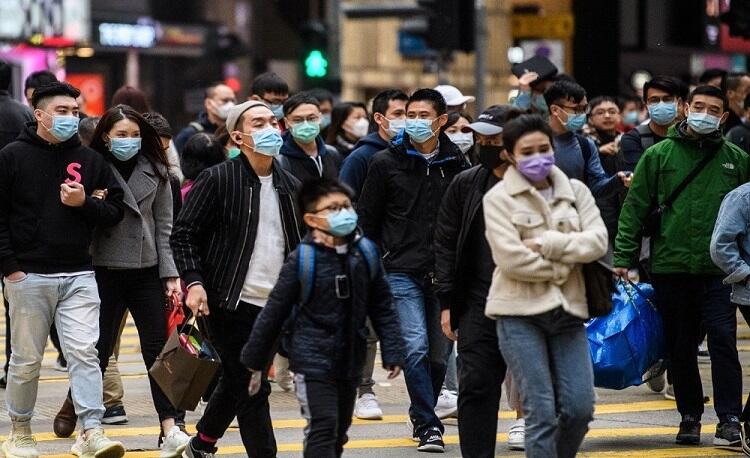China Can’t Mask Impact of Coronavirus
Article By : Junko Yoshida

The Covid-19 coronavirus outbreak in China has exposed the best and the worst aspects of the world’s biggest totalitarian nation.
You don’t need to be a scientist or an engineer to understand that a midstream change in your data collection methods isn’t a good idea. Not only does it disrupt data integrity, but it also muddles your analysis.
That’s what unfolded in China on Thursday.
Hubei province reported 14,840 new cases of the dreaded coronavirus, a tenfold surge over Wednesday’s toll, while new fatalities more than doubled to 242. Before that, China had been saying that the rate of infections across a span of eight days had stabilized. But a new number, based on a new methodology, queered that narrative.
The Covid-19 coronavirus outbreak in China has exposed the best and the worst aspects of the world’s biggest totalitarian nation.
On one hand, China’s aversion to transparency has fueled fear, making the world more suspicious of official Chinese data and its other announcements about the epidemic.
On the other hand, sequestering its citizens at home for more than ten days in the name of disease “prevention and control” is a massive social experiment that few nations other than China could have enforced.
For people outside China, the coronavirus crisis has manifested itself in shocks such as the cancellation of the Mobile World Congress (MWC), or horror stories of people trapped on cruise liners with other infected travelers.
To many people in the United States, this is a China story. But look again. MWC is a global event with seismic impact on the world economy in general and particularly in the China-dependent electronics industry. If the epidemic isn’t contained in relatively short order, there will be serious consequences for the computer industry, the automotive industry, the communications industry, the travel industry, and more.
What our colleagues are saying
But what is actually going on in China? Fortunately, we have colleagues at EE Times China on the ground in Shenzhen and Beijing.
Our team is working around the clock from their homes, pumping out reportage that illuminates the impact of the outbreak on the electronics industry. As of this week, none on our team, however, has returned to the office in Shenzhen.
We hold regular meetings via WeChat and inquire about how things are going in China. They maintain normalcy, sound good-natured, and sometimes even laugh about their predicament.
But obviously, that can’t be the whole story.
Picture a life in which you’re not allowed, for ten days or more, to set foot out of your own house. Imagine living with kids locked out of school (and underfoot) for weeks. Picture an endless cycle of takeout food, broken only by a delivery of groceries.

Daily life in this state of voluntary house-arrest is anything but normal. I posed this issue to Echo Zhao, one of my colleagues. She told me, “If policemen and hospital workers are risking their lives to save those infected on the front line, staying home — not going outside — is the least we can do for the country.”
Reflexive patriotism? Perhaps.
I also know she’s sincere. She isn’t just spouting the Party line. She represents 1.4 billion ordinary Chinese people who are determined to survive.
She wants to be resilient.
Many ordinary Chinese people just wanting to do whatever they can to get through the crisis. One story was filed this week by another colleague, Luffy Liu. It’s entitled “China's Tech Companies Start Production of Face Masks.”
He wrote about automotive companies (i.e. BYD and others) and smartphone manufacturers (i.e. Foxconn et al) converting production lines to make surgical masks. Right now, Wuhan’s nine million residents could use as many as 20 million masks a day, but they don’t have them enough. Companies of all types are scrambling, switching production to meet the demand for masks from more than a billion frightened people.
Opportunistic? Yes.
Some overnight mask manufacturers are obviously in it for the money.
But some are in it for the sake of self-preservation. Foxconn, for example, has nearly a million employees. If Foxconn wants its workers to be back on the assembly lines while meeting the local government’s disease prevention guidelines, it needs to hoard the almost two million masks it’s planning to produce for internal use.
Meanwhile, according to a notice recently issued by the Guangdong Provincial People’s Government, the provincial government will provide relevant enterprises with funding support for companies expanding mask production, mask manufacturing machines, and other urgently needed equipment and materials.
Resumption of work
Last week, many companies started to restore operations. The resumption of work, however, is no cakewalk. Guangdong province, for example, has reiterated that companies must manage the resumption of work and production by “coordinating the return of employees, especially professional technicians, and the purchase of preventive and control materials such as masks, protective clothing, disinfection supplies, and thermometers.”
In math-class terms, you’ve gotta show your work.
The rules don’t apply to just the 800-pound gorilla in the province, Foxconn. Local companies of all sizes are under enormous pressure to ensure worker safety as they resume business.
Take the example of another behemoth, Huawei. As Huawei brings employees back, it faces new guidelines. During lunch time, for example, workers are required to sit no closer together than two meters, leaving each person all alone at a really big table.
The Guangdong provincial government, in a burst of classic bureaucratese, is ordering enterprises “to do a good job of employee health management; encouraging large enterprises to set up centralized isolation points; encouraging all kinds of development zones above the provincial level (high-tech zones, economic development zones, industrial parks) to set up centralized isolation points by the management committee.”
It adds, “For small and medium-sized enterprises that do not have their own conditions for centralized isolation, the local government will make centralized arrangements.”
Industry get-togethers?
As people start getting back to the office, the electronics industry has begun resuming its industry meetings, with mixed results. One company just discovered that an employee who attended a recent industry get-together was infected by the Covid-19 coronavirus. Unaware of being contagious, this person met close to a dozen industry colleagues. Imagine what followed after the disclosure of that information. Companies had to look for not just who, from which departments, attended the contaminated meeting, but whom they contacted afterward.
This sort of emergency detective work takes an emotional toll on large circles of potential victims that include friends, neighbors, colleagues and associates.
There have been several reports from China about neighbors also being encouraged to inform on one another, especially if they suspect someone is from Hubei. The New York Times last week reported that in the northern province of Hebei, for example, one county offered a bounty of 1,000 yuan, or about $140, for each Wuhan person fingered by an informant.
China’s network of surveillance systems are at full vigor.
Reuters reported that when a man from Hangzhou returned home from a business trip, the local police got in touch. “They had tracked his car by his license plate in nearby Wenzhou, which has had a spate of coronavirus cases despite being far from the epicenter of the outbreak. Stay indoors for two weeks, they requested,” according to Reuters.
As it turned out, this person, after staying home for about 12 days, got bored and broke out. “Not only did the police contact him,” Reuters reported. “So did his boss. He had been spotted near Hangzhou’s West Lake by a camera with facial recognition technology, and the authorities had alerted his company as a warning.”
Big Brother is watching.
These anecdotes tend to reinforce Western reservations about China, making people wonder what it would be like to live there.
But the issue at hand is neither about whether Chinese like being surveilled or approve of neighbors spying on neighbors. Nor is it about whether we who live outside China approve of its society.
The reality exposed by the virus is that China can’t be isolated forever. It’s a house too big to quarantine. The world economy can’t afford to stand still. Business must go on.
Our Chinese colleagues are now conducting a survey among more than a dozen companies in the electronics industry with offices in China.
Fendy Wang, managing chief analyst of ESM-China, EETimes’ sister publication, sent us an email saying:
The outbreak of the new coronavirus in Wuhan-China has caused a significant impact on the electronics industry chain. In order to further investigate the impact of the epidemic, last week we sent a questionnaire survey to electronics companies. As of now, seven companies have responded. They are Arrow, Digi-key (telephone interview), Mouser, Resistor. Today, Oneyac, iCEasy, and a Chinese fabless-Runshi technology.
In addition, Beijing-based principal analyst Lefeng Shao sent the questionnaire to international chip companies such as TI, NXP, ADI, TE, Onsemi, Renesas and others. Onsemi refused to accept the interview, ADI told us that they would respond next Monday, and the rest of the companies said that they had no time to respond.
Fendy is writing a story as I type my blog.
Our duty as reporters does not include recirculating feel-good stories approved by the Chinese government, or the echoes of those stories that Chinese companies might feel compelled to share. Everyone — inside and outside of China — needs to make decisions, not just about health but also about how to keep the global economy humming. Under any circumstances, incomplete information can lead to bad decisions, and false information tends to move people and companies into the wrong directions.
Finding accurate information and sharing it isn’t just some nebulous principle; it is vital to a functioning economy and a functional society. We will continue to investigate the true impact of this crisis and report on the “work-arounds” that companies around the world are coming up with to keep themselves afloat.
As Bolaji Ojo, publisher of AspenCore Media, which owns EE Times, told me yesterday: “We’re writing history. Let’s get to work.”